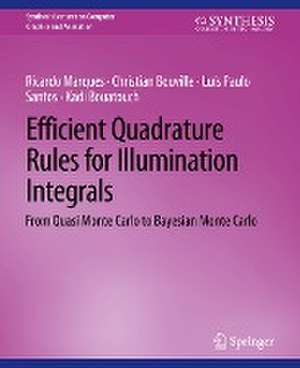Efficient Quadrature Rules for Illumination Integrals: From Quasi Monte Carlo to Bayesian Monte Carlo: Synthesis Lectures on Visual Computing: Computer Graphics, Animation, Computational Photography and Imaging
Autor Ricardo Marques, Christian Bouville, Luís Paulo Santos, Kadi Bouatouchen Limba Engleză Paperback – 8 iun 2015
Din seria Synthesis Lectures on Visual Computing: Computer Graphics, Animation, Computational Photography and Imaging
- 20%
 Preț: 152.95 lei
Preț: 152.95 lei - 20%
 Preț: 522.92 lei
Preț: 522.92 lei -
 Preț: 411.93 lei
Preț: 411.93 lei -
 Preț: 263.06 lei
Preț: 263.06 lei -
 Preț: 349.16 lei
Preț: 349.16 lei -
 Preț: 349.74 lei
Preț: 349.74 lei -
 Preț: 385.62 lei
Preț: 385.62 lei -
 Preț: 390.46 lei
Preț: 390.46 lei -
 Preț: 259.96 lei
Preț: 259.96 lei -
 Preț: 383.33 lei
Preț: 383.33 lei -
 Preț: 351.41 lei
Preț: 351.41 lei -
 Preț: 206.84 lei
Preț: 206.84 lei -
 Preț: 191.87 lei
Preț: 191.87 lei -
 Preț: 351.41 lei
Preț: 351.41 lei -
 Preț: 446.47 lei
Preț: 446.47 lei -
 Preț: 447.03 lei
Preț: 447.03 lei -
 Preț: 412.30 lei
Preț: 412.30 lei -
 Preț: 264.97 lei
Preț: 264.97 lei -
 Preț: 234.87 lei
Preț: 234.87 lei -
 Preț: 234.87 lei
Preț: 234.87 lei -
 Preț: 247.72 lei
Preț: 247.72 lei -
 Preț: 191.31 lei
Preț: 191.31 lei -
 Preț: 234.87 lei
Preț: 234.87 lei -
 Preț: 234.87 lei
Preț: 234.87 lei -
 Preț: 234.87 lei
Preț: 234.87 lei -
 Preț: 279.81 lei
Preț: 279.81 lei -
 Preț: 351.41 lei
Preț: 351.41 lei -
 Preț: 234.87 lei
Preț: 234.87 lei -
 Preț: 351.41 lei
Preț: 351.41 lei -
 Preț: 383.72 lei
Preț: 383.72 lei -
 Preț: 191.31 lei
Preț: 191.31 lei -
 Preț: 265.18 lei
Preț: 265.18 lei -
 Preț: 261.32 lei
Preț: 261.32 lei -
 Preț: 266.70 lei
Preț: 266.70 lei
Preț: 247.72 lei
Nou
Puncte Express: 372
Preț estimativ în valută:
47.40€ • 51.65$ • 39.94£
47.40€ • 51.65$ • 39.94£
Carte tipărită la comandă
Livrare economică 19-25 aprilie
Preluare comenzi: 021 569.72.76
Specificații
ISBN-13: 9783031795664
ISBN-10: 3031795660
Ilustrații: X, 82 p.
Dimensiuni: 191 x 235 mm
Editura: Springer International Publishing
Colecția Springer
Seriile Synthesis Lectures on Visual Computing: Computer Graphics, Animation, Computational Photography and Imaging, Synthesis Lectures on Computer Graphics and Animation
Locul publicării:Cham, Switzerland
ISBN-10: 3031795660
Ilustrații: X, 82 p.
Dimensiuni: 191 x 235 mm
Editura: Springer International Publishing
Colecția Springer
Seriile Synthesis Lectures on Visual Computing: Computer Graphics, Animation, Computational Photography and Imaging, Synthesis Lectures on Computer Graphics and Animation
Locul publicării:Cham, Switzerland
Cuprins
Introduction.- Spherical Fibonacci Point Sets for QMC Estimates of Illumination Integrals.- Bayesian Monte Carlo for Global Illumination.- Bibliography.- Authors' Biographies.
Notă biografică
Ricardo Marques received his Master's degree in Computer Graphics and Distributed Parallel Computation from Universidade do Minho (Fall 2009), after which he worked as a researcher in the same university. He joined INRIA and the FRVSense team as a PhD student in Fall 2010 under the supervision of Kadi Bouatouch. His thesis work has focused on spherical integration methods applied to light transport simulation. He defended his PhD thesis in Fall 2013 and joined the Mimetric INRIA research team as a research engineer in 2014.Christian Bouville is presently an invited researcher in the FRVSense team at IRISA in Rennes, France. He was a team leader, project leader, and Emeritus expert at Orange Labs until 2006 and has been involved in many European and national projects. His main fields of research are now global illumination models and image-based rendering with a special interest in machine learning approaches.Luis Paulo Santos in an Assistant Professor at the Universidade do Minho, Portugal. He published several papers on both computer graphics and parallel processing on international conferences and journals. He managed two nationally funded graphics R&D projects and participates in multiple European projects with both academia and industry. His main research interests lie on Interactive Global Illumination and Parallel Processing. He has been a member of the Direction Board of the Portuguese chapter of Eurographics since 2008, was Deputy Director of the University of Minho's Department of Informations from 2010-2012, and Director of the Doctoral Program on Informatics over the same period. He also acts as Associated Editor of Elsevier's Computers & Graphics journal.Kadi Bouatouch was an electronics and automatic systems engineer (ENSEM 1974). He was awarded a PhD in 1977 and a higher doctorate in computer science in the field of computer graphics in 1989. He is working on global illumination, lighting simulation for complex environments, GPU-base rendering, andcomputer vision. He is currently a Professor at the University of Rennes 1 (France) and a researcher at IRISA. He is a member of Eurographics.
